Are you ready to dive into the world of organic gardening? Mastering the Rodale Organic Gardening Basics is the first step towards creating a sustainable and healthy garden right in your backyard! Organic gardening is all about growing plants without the use of synthetic fertilizers, pesticides, and genetically modified organisms. Instead, it focuses on nurturing the soil, promoting biodiversity, and working in harmony with nature. Whether you’re a beginner or have some experience, these basics will provide you with the knowledge and techniques to grow your own organic garden with confidence.
Key Takeaways:
- Organic gardening is a sustainable and environmentally friendly approach to growing plants.
- It focuses on nurturing the soil, promoting biodiversity, and working in harmony with nature.
- By following the Rodale Organic Gardening Basics, you can create a thriving and healthy garden in your own backyard.
- Mastering the basics will empower you to grow your own organic food and contribute to a more sustainable future.
The Rodale Institute’s Approach to Regenerative Organic Agriculture
The Rodale Institute, a leader in organic gardening since 1947, has a unique approach to agriculture known as regenerative organic farming, which encompasses not only sustainable practices but also a deep commitment to soil health, animal welfare, and worker fairness. This holistic approach to farming goes beyond simply maintaining resources; it aims to improve them for the benefit of future generations.
At the core of regenerative organic agriculture is soil health. The Rodale Institute recognizes that the health of the soil is intrinsically linked to the overall health of the food system. By prioritizing soil health, they are able to foster the growth of healthy plants, improve the quality of the food produced, and contribute to the well-being of the environment and the communities they serve.
“Soil health affects everything from plant health to human wellbeing and the future of our planet.”
The Rodale Institute’s commitment to soil health is part of a larger vision that encompasses high standards for animal welfare and worker fairness. By creating farm systems that work in harmony with nature, they aim to improve the quality of life for every creature involved, from the plants and animals to the farmers and workers who tend to them.
The Rodale Institute’s regenerative organic approach to farming is not just a concept; it is a certification program known as Regenerative Organic Certified™ (ROC). This certification is overseen by the Regenerative Organic Alliance, a non-profit organization made up of experts in farming, ranching, soil health, animal welfare, and farmer and worker fairness. It sets a high bar for agricultural practices that prioritize the health of the soil, the welfare of animals, and the well-being of farmers and workers.
Regenerative Organic Certified™ (ROC)
ROC is a new certification program introduced by the Rodale Institute in 2018. It aims to provide consumers with a clear choice when it comes to supporting regenerative organic agriculture. ROC-certified products meet the highest standards for soil health, animal welfare, and worker fairness.
The Rodale Institute believes that by embracing regenerative organic farming practices, we can create a more sustainable and resilient food system that nourishes both people and the planet. Their commitment to research, education, and advocacy has made them a trusted source of information and a leader in the organic gardening community.
With the Rodale Institute’s approach and certification program, we can all play a part in building a better future through regenerative organic agriculture.
Building a Foundation – The Importance of Soil Health
Healthy soil is the key to successful organic gardening, and understanding how to build and maintain soil health is essential for mastering the Rodale Organic Gardening Basics. Organic soil management techniques such as composting and the incorporation of organic matter play a vital role in nurturing the soil and ensuring its fertility.
Composting is a natural process that transforms organic waste, such as kitchen scraps and yard trimmings, into nutrient-rich compost. This compost can be added to the soil to improve its structure, water retention, and nutrient content. By recycling organic materials through composting, we not only reduce waste but also enhance the health of our soil.
Soil fertility is another important aspect of organic gardening. Fertile soil provides the necessary nutrients for plants to thrive and produce abundant yields. Organic gardeners rely on the natural nutrient cycle, incorporating organic matter into the soil to replenish its fertility. This can be done through the addition of compost, animal manure, cover crops, or other organic amendments.
“Healthy soil is not only crucial for plant health, but it also plays a significant role in supporting the overall ecosystem.“
By maintaining soil health, organic gardeners create an environment that promotes beneficial organisms such as earthworms, microorganisms, and beneficial bacteria. These organisms contribute to the breakdown of organic matter, improve soil structure, and enhance nutrient availability to plants. They also help suppress pests and diseases, reducing the need for chemical interventions.
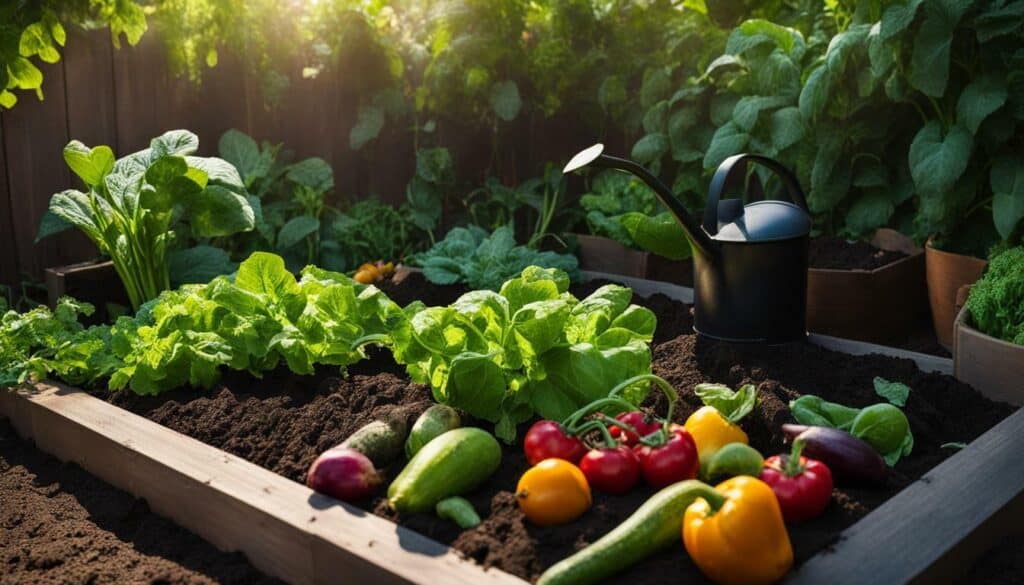
The Role of Organic Matter
Organic matter is a key component of healthy soil. It acts as a sponge, holding moisture and nutrients, while also improving soil structure and drainage. Organic matter includes materials such as compost, leaf litter, and decaying plant and animal matter.
When organic matter is incorporated into the soil, it becomes a source of nutrients for plants and provides food for beneficial soil organisms. It also helps to create spaces in the soil, allowing air and water to circulate, supporting root growth and nutrient uptake. Adding organic matter regularly can improve soil fertility and overall garden productivity.
Organic gardening emphasizes the importance of building and maintaining soil health through organic soil management techniques such as composting and the incorporation of organic matter. By nurturing the soil, we lay the foundation for a thriving organic garden that is both productive and sustainable.
Nurturing Plant Health with Organic Techniques
Once you have a solid foundation of soil health, the next step in mastering the Rodale Organic Gardening Basics is learning how to nurture plant health using organic techniques. By implementing these techniques, you can ensure that your plants grow strong and thrive in a natural and sustainable way.
One of the key aspects of organic gardening is pest control. Instead of relying on harmful chemicals, organic gardening techniques prioritize natural methods to keep pests at bay. This can include introducing beneficial insects, such as ladybugs or praying mantises, that feed on harmful pests. Additionally, you can create physical barriers, like netting or row covers, to protect your plants from insects.
Another important aspect of nurturing plant health is using natural fertilizers. Organic gardeners avoid synthetic fertilizers and instead opt for natural alternatives. Compost, for example, is a rich source of nutrients and can be made from kitchen scraps and yard waste. It not only adds nutrients to the soil but also improves its structure and water-holding capacity.
Companion planting is another organic gardening technique that can enhance plant health. Certain plants have natural affinities and when grown together, they can benefit each other by repelling pests or improving soil fertility. For example, planting marigolds alongside tomatoes can deter harmful nematodes.
Crop rotation is an essential practice to prevent the buildup of pests and diseases in your garden. By regularly rotating your crops, you disrupt the life cycles of pests and reduce the risk of plant diseases. It also helps to balance nutrient availability in the soil, ensuring that different crops utilize different nutrients.
| Organic Gardening Techniques | Pest Control | Natural Fertilizers | Companion Planting | Crop Rotation |
|---|---|---|---|---|
| Definition | Using natural methods to control pests and prevent damage to plants | Using organic materials and nutrients to enrich the soil and support plant growth | Planting beneficial plants together to enhance growth and repel pests | Rotating crops to prevent the buildup of pests and diseases |
| Examples | Introducing beneficial insects, creating physical barriers | Compost, manure, seaweed extract | Planting marigolds with tomatoes, beans with corn | Rotating tomatoes with lettuce, beans with carrots |
By incorporating these organic gardening techniques into your practice, you can maintain plant health while avoiding the use of harmful chemicals. This not only benefits your garden but also promotes a healthier and more sustainable ecosystem.
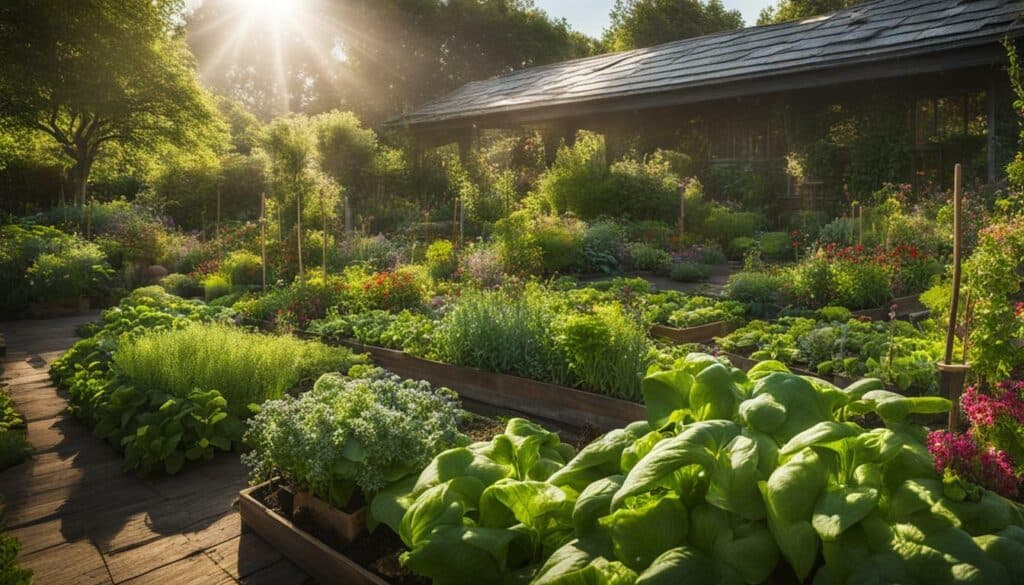
“Organic gardening techniques prioritize natural methods to keep pests at bay and nurture plant health.”
– Deborah L. Martin, Rodale’s Basic Organic Gardening
In the next section, we will explore the specifics of growing your own organic food and the importance of proper garden layout for maximizing yields.
Growing Your Own Organic Food
Imagine being able to enjoy fresh, organic produce straight from your own garden. In this section, we will explore the ins and outs of growing your own organic food and how to make the most of your garden space.
Organic vegetable gardening is a rewarding and sustainable way to feed yourself and your family. By following organic gardening principles, you can ensure that your vegetables are free from harmful pesticides and chemicals. Start by selecting the vegetables you want to grow based on your family’s preferences and the climate in your area. Consider factors such as sunlight requirements and planting seasons to maximize your success.
When it comes to growing organic fruits, choose varieties that are well-suited to your region and climate. Fruit trees and bushes can be a wonderful addition to your garden, providing you with a bountiful harvest year after year. Be sure to give them enough space to grow and thrive, and follow proper pruning and fertilization techniques to maximize their productivity.
Maintaining organic herbs is a great way to add flavor to your culinary creations while enjoying the benefits of fresh and aromatic herbs. Whether you choose to grow them in containers or in your garden, herbs like basil, rosemary, and thyme are easy to care for and can be harvested as needed.
When planning your organic garden layout, consider factors such as sunlight, water accessibility, and the space required for each plant. Group plants with similar needs together, and use companion planting techniques to maximize their growth potential. For example, planting marigolds alongside tomatoes can help deter pests and promote healthier plants.
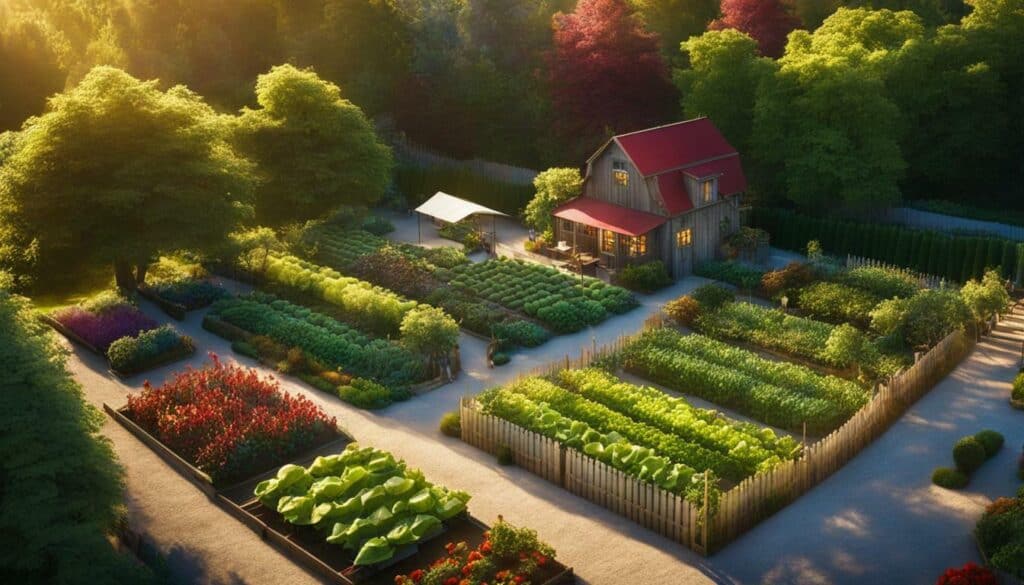
By growing your own organic food, you can take control of what goes into your body and reduce your carbon footprint. Plus, there’s nothing quite like the satisfaction of harvesting your own homegrown produce. So, roll up your sleeves, grab your gardening tools, and get ready to cultivate a thriving organic garden!
Troubleshooting Common Organic Gardening Challenges
While organic gardening offers numerous benefits, it can also present unique challenges. In this section, we will troubleshoot common issues and provide practical solutions to help you overcome them.
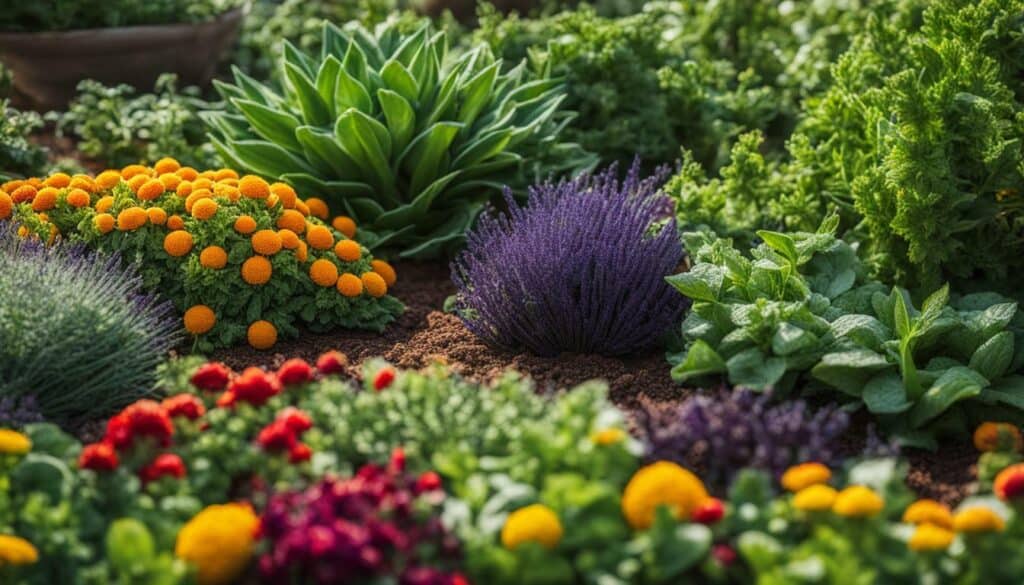
One of the most common challenges in organic gardening is dealing with pests. However, there are effective organic pest management techniques that can help protect your plants without the use of chemical pesticides.
Organic Pest Management Tips:
- Encourage beneficial insects such as ladybugs and lacewings, which feed on pests like aphids and caterpillars.
- Use physical barriers such as row covers or netting to protect plants from pests.
- Make homemade organic pest sprays using ingredients like neem oil, garlic, or hot pepper. These sprays can deter pests and minimize damage to your plants.

Another challenge in organic gardening is preventing plant diseases. However, practicing good garden hygiene and implementing preventive measures can help minimize the risk of diseases spreading.
Disease Prevention Tips:
- Start with healthy plants and seeds from reputable sources to reduce the risk of diseases.
- Practice crop rotation, which involves changing the location of plants each year to prevent the buildup of disease-causing organisms in the soil.
- Remove and dispose of any infected plant material promptly to prevent the spread of diseases.
- Regularly inspect your plants for signs of diseases and take appropriate action, such as pruning affected areas or applying organic disease control methods.
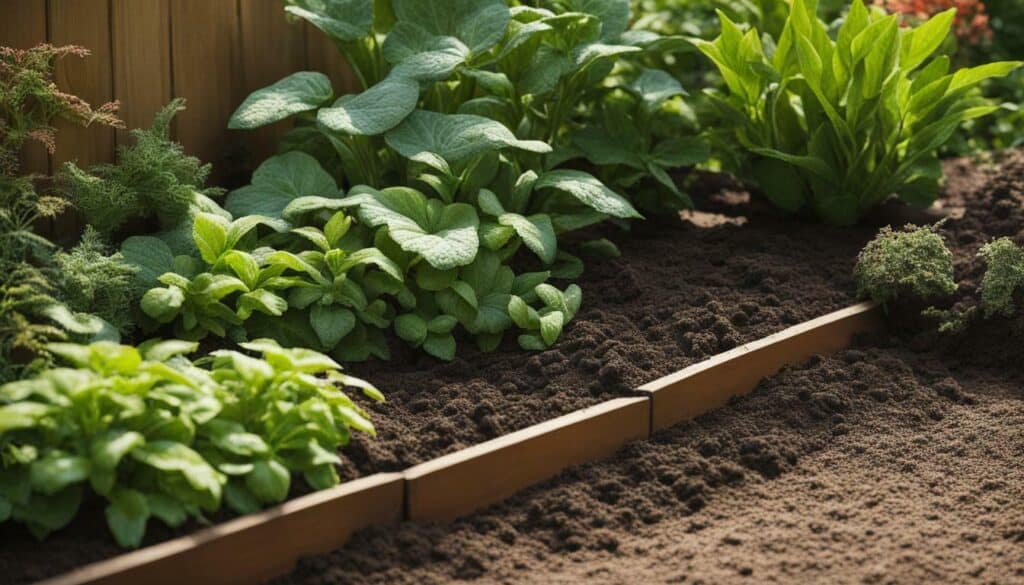
Nutrient deficiencies can occur in organic gardening due to the absence of synthetic fertilizers. However, there are organic methods to address these deficiencies and ensure your plants receive the necessary nutrients.
Nutrient Deficiency Solutions:
“I found that adding organic matter like compost or well-rotted manure to the soil can help replenish nutrients and improve overall soil fertility.”
In addition to organic matter, you can also use organic fertilizers that are specifically formulated to address nutrient deficiencies. These fertilizers are made from natural sources such as seaweed, bone meal, or fish emulsion.
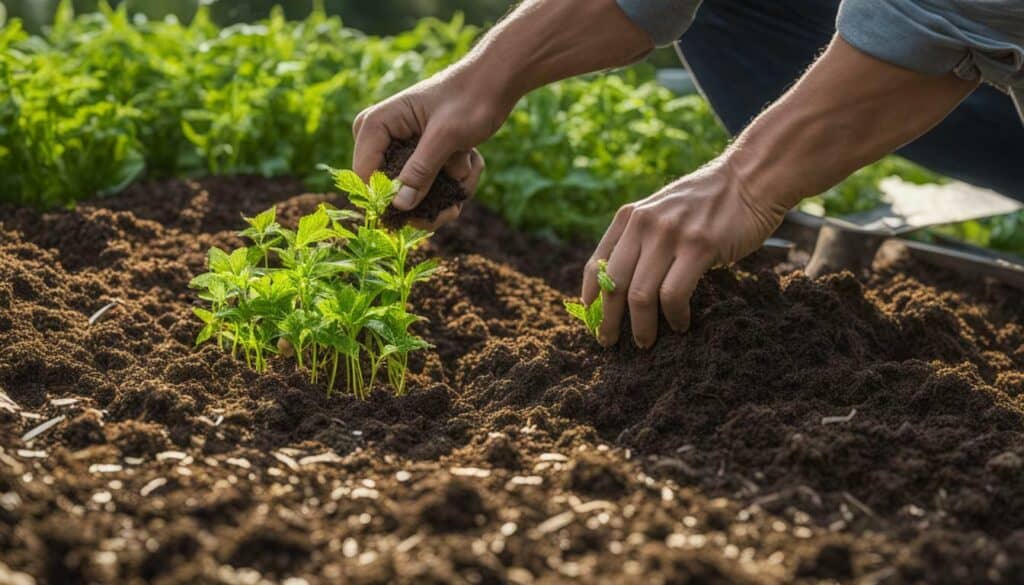
Finally, controlling weeds can be a challenge in organic gardening. However, there are organic methods that can help suppress weed growth and maintain a weed-free garden.
Weed Control Tips:
- Mulch your garden beds with organic materials like straw or wood chips to suppress weed growth and conserve moisture.
- Use manual cultivation methods such as hand weeding or hoeing to remove weeds.
- Practice proper spacing between plants to minimize weed competition and make it easier to remove weeds.
- Consider using a flame weeder, which uses heat to kill weeds without the use of chemicals.
By implementing these practical solutions, you can effectively troubleshoot common organic gardening challenges and create a thriving organic garden.
Embracing the Principles of Organic Gardening
Organic gardening extends beyond the boundaries of our individual gardens, as it embodies principles that contribute to environmental sustainability, biodiversity, and conservation. By practicing organic gardening, we become stewards of the land, nurturing the health of our ecosystems and protecting the planet.
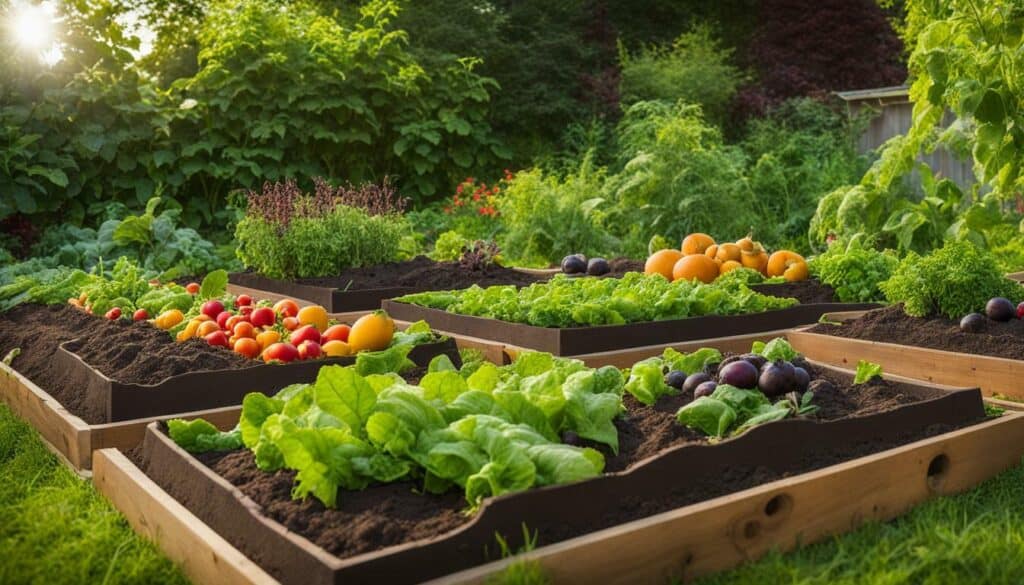
The principles of organic gardening guide our approach to creating a harmonious and balanced relationship with nature. By following these principles, we can make a positive impact and promote a healthier environment for ourselves and future generations.
Environmental Sustainability
One of the core principles of organic gardening is environmental sustainability. This means minimizing our ecological footprint and preserving natural resources. Organic gardeners strive to use sustainable practices that do not deplete soil nutrients, pollute water sources, or harm beneficial organisms.
By implementing techniques such as composting, mulching, and water conservation methods, we can ensure the long-term health and viability of our gardens. Organic gardening promotes a regenerative approach, where our actions enhance the natural systems instead of depleting them.
Biodiversity
Organic gardening recognizes the importance of biodiversity in creating resilient and thriving ecosystems. By cultivating a wide variety of plants and providing habitat for beneficial insects, birds, and other wildlife, we can create a balanced ecosystem that is more resistant to pests and diseases.
Embracing biodiversity also means avoiding the use of synthetic chemicals that can harm beneficial insects and disrupt the natural balance. Organic gardeners prioritize the use of natural pest control methods and encourage the presence of predatory insects and birds that help keep pest populations in check.
Conservation
Conservation is another fundamental principle of organic gardening. It involves preserving and protecting natural resources and minimizing waste. Organic gardeners practice responsible water management, choosing drought-tolerant plants and implementing efficient irrigation methods.
We also conserve energy by utilizing sustainable practices such as composting, which reduces the need for synthetic fertilizers and energy-intensive manufacturing processes. Conservation extends to the wise use of resources, ensuring that we leave a smaller ecological footprint and preserve the beauty and integrity of our environment.
Organic gardening is not only about growing healthy plants; it is about creating a sustainable and biodiverse environment that supports life in all its forms.
By embracing the principles of organic gardening, we not only create thriving gardens but also contribute to a healthier planet. Our gardens become havens for wildlife, and our sustainable practices inspire others to follow in our footsteps.
So let’s take the first step in our organic gardening journey by incorporating these principles into our gardening practices. Together, we can make a difference and create a more sustainable and biodiverse world, one garden at a time.
Resources for Further Learning
As you continue to deepen your understanding and practice of the Rodale Organic Gardening Basics, there are a wealth of resources available to support your learning journey. Whether you prefer books, online courses, or workshops, the Rodale Institute offers a range of options to cater to your needs.
| Resource | Description |
|---|---|
| Rodale Institute | The Rodale Institute’s website is a treasure trove of information on organic gardening. From articles and blog posts to research papers, you’ll find a wealth of resources to expand your knowledge. |
| Organic Gardening Books | Explore the wide selection of organic gardening books available from the Rodale Institute. These books cover various topics, from beginner’s guides to in-depth techniques, providing valuable insights and practical guidance. |
| Online Courses | Take advantage of the online courses offered by the Rodale Institute to enhance your understanding of organic gardening. These courses are designed to cater to different levels of expertise and cover a range of topics relevant to organic gardening principles and practices. |
| Workshops | Attend workshops conducted by the Rodale Institute to gain hands-on experience and learn from experts in the field. These workshops provide valuable opportunities to ask questions, interact with like-minded individuals, and further develop your skills in organic gardening. |
As you continue on your organic gardening journey, these resources will serve as valuable companions, providing you with the knowledge and guidance you need to cultivate a thriving and sustainable garden.
Embrace Your Organic Gardening Journey
As you delve into the Rodale Organic Gardening Basics, remember that organic gardening is not just a set of techniques—it’s a way of life that promotes environmental sustainability, biodiversity, and conservation. By adopting these principles, you become a steward of the land, contributing to the well-being of the planet.
So, equip yourself with the Rodale Institute’s resources, immerse yourself in the world of organic gardening, and let your garden flourish with the beauty and abundance of nature.
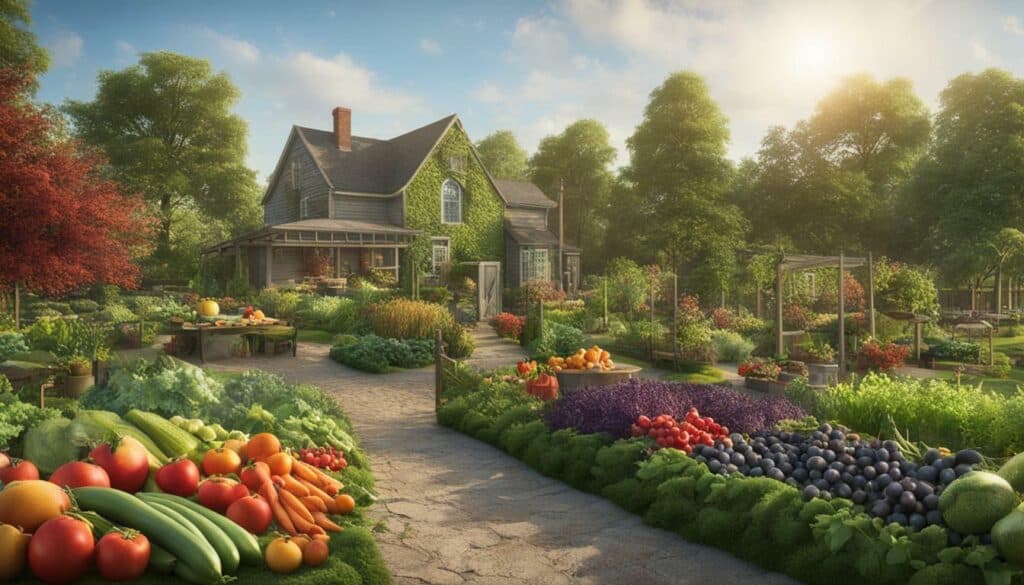
Cultivating a Thriving Organic Garden
Congratulations on taking the first steps to mastering the Rodale Organic Gardening Basics! By applying these principles and techniques, you are on your way to cultivating a thriving organic garden that will bring you joy and nourishment for years to come. Sustainable gardening is not only beneficial for your own well-being but also for the health of the planet. With a focus on organic gardening practices, you can create a healthy garden that supports biodiversity and conserves natural resources.
In your journey towards a healthy garden, it is important to prioritize soil health. As Robert Rodale, the son of J.I. Rodale, the founder of the Rodale Institute, emphasized, soil health is the foundation of regenerative organic agriculture. By nurturing the soil through organic soil management techniques such as composting and maintaining organic matter, you can ensure that your plants receive the essential nutrients they need to thrive.
Another key aspect of cultivating a thriving organic garden is using organic gardening techniques to nurture plant health. Organic pest control methods, natural fertilizers, companion planting, and crop rotation are all effective techniques that promote the well-being of your plants. By avoiding harmful chemicals and embracing these organic techniques, you can create a healthy ecosystem within your garden.
Growing your own organic food is a rewarding experience that allows you to have control over what you consume. Whether it’s organic vegetable gardening, growing organic fruits, or maintaining organic herbs, you can enjoy the benefits of fresh, nutritious produce right from your garden. By carefully planning your garden layout and considering factors such as sunlight, water, and spacing, you can optimize your yields and create a productive organic garden.
While organic gardening offers numerous benefits, it is not without its challenges. However, with the right knowledge and tools, you can overcome common issues such as organic pest management, disease prevention, nutrient deficiencies, and weed control. By staying vigilant and implementing effective strategies, you can ensure that your organic garden remains healthy and thriving.
Embracing the principles of organic gardening goes beyond your own garden. It contributes to the larger goal of environmental sustainability, biodiversity, and conservation. By choosing organic gardening practices, you play a vital role in preserving the health of the land and the well-being of the planet. Your organic garden can serve as a sanctuary for beneficial insects, birds, and other wildlife, creating a harmonious and vibrant ecosystem.
If you’re eager to deepen your knowledge and continue your organic gardening journey, there are plenty of resources available. The Rodale Institute offers a wealth of information, including books, online courses, and workshops, to further your understanding of the Rodale Organic Gardening Basics. With these resources, you can expand your skills and become an even more proficient organic gardener.
Congratulations again on taking the first steps towards mastering the Rodale Organic Gardening Basics. By cultivating a thriving organic garden, you are not only providing yourself and your loved ones with healthy, nutritious food, but you are also making a positive impact on the environment. So, roll up your sleeves and enjoy the journey of sustainable gardening! Your healthy garden awaits.
FAQ
Q: What is regenerative organic agriculture?
A: Regenerative organic agriculture is a holistic approach to farming that goes beyond sustainable practices. It aims to not only maintain resources but also improve them. It prioritizes soil health, while also encompassing high standards for animal welfare and worker fairness.
Q: What is the Rodale Institute?
A: The Rodale Institute is an organization that has been conducting groundbreaking research on regenerative organic agriculture since 1947. They are leaders in the organic movement and advocate for the principles of organic gardening and farming.
Q: Why is soil health important in organic gardening?
A: Soil health is intrinsically linked to the total health of our food system. It affects everything from plant health to human wellbeing and the future of our planet. Nurturing and caring for the soil is crucial in organic gardening to create a thriving garden.
Q: What are some organic gardening techniques?
A: Organic gardening techniques include natural pest control methods, the use of organic fertilizers, companion planting, and crop rotation. These techniques help nurture plant health and promote a balanced ecosystem in the garden.
Q: How can I grow my own organic food?
A: Growing organic food in your garden involves practices such as organic vegetable gardening, growing organic fruits, maintaining organic herbs, and considering the layout of your garden for maximum yields. These practices ensure that the food you grow is free from synthetic chemicals and promotes a healthier lifestyle.
Q: What are some common challenges in organic gardening?
A: Common challenges in organic gardening include managing pests organically, preventing diseases, identifying and treating nutrient deficiencies, and controlling weeds. There are effective solutions for each of these challenges that can be implemented in an organic garden.
Q: What are the principles of organic gardening?
A: The principles of organic gardening include environmental sustainability, biodiversity, and conservation. Organic gardening practices prioritize the health of the ecosystem and aim to create a harmonious relationship between humans, plants, and animals.
Q: Where can I find resources for further learning on organic gardening?
A: The Rodale Institute offers various resources for further learning on organic gardening, including books, online courses, and workshops. These resources provide in-depth knowledge and guidance for those looking to deepen their understanding of organic gardening.
Q: How can I cultivate a thriving organic garden?
A: By mastering the Rodale Organic Gardening Basics and applying them in your garden, you can cultivate a thriving organic garden. This involves nurturing soil health, implementing organic gardening techniques, and embracing the principles of organic gardening.
What are the Rodale Organic Gardening Basics and How Do They Compare to the Basic Book of Organic Gardening?
The Rodale Organic Gardening Basics offers comprehensive guidance on organic gardening practices. It covers topics like soil health, composting, pest control, and more. The basic organic gardening book, on the other hand, provides a general overview of organic gardening principles. While both resources are valuable, the Rodale guide delves deeper into the specifics and offers a more comprehensive approach to organic gardening.


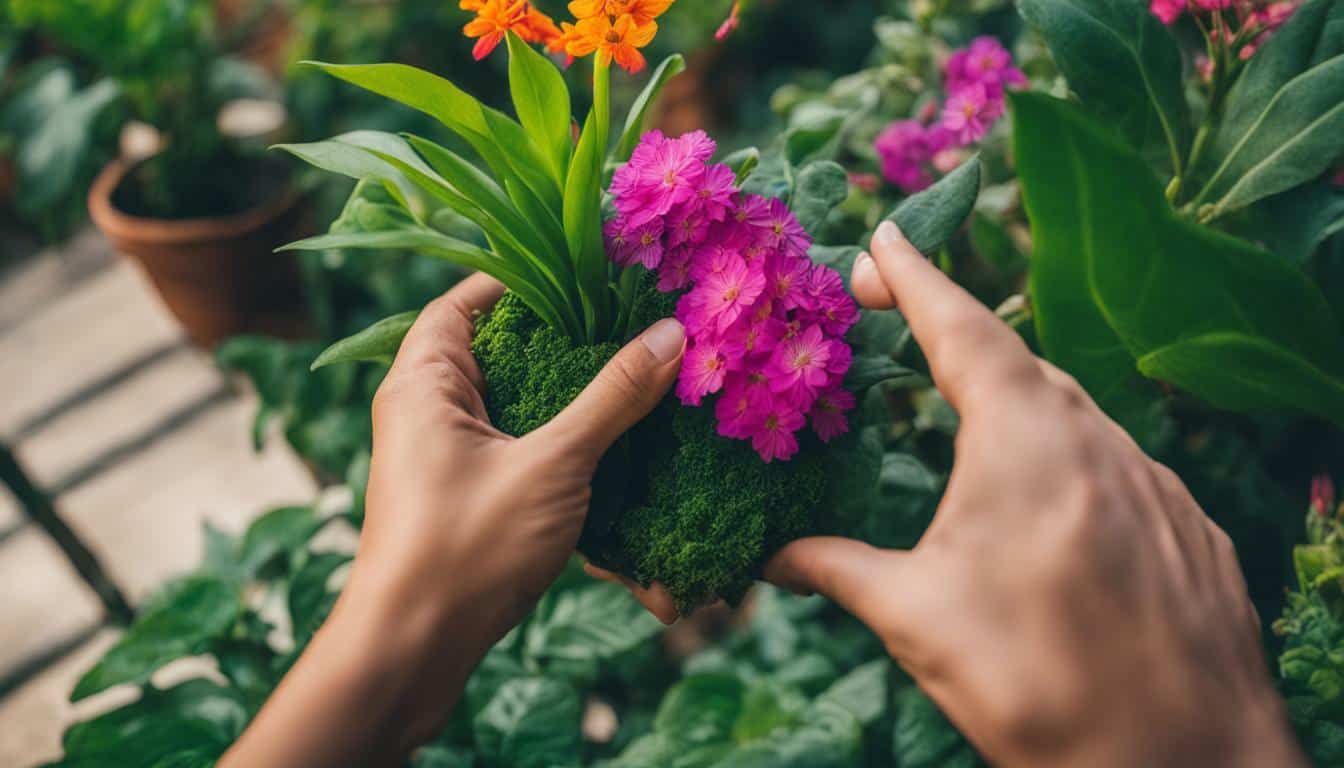
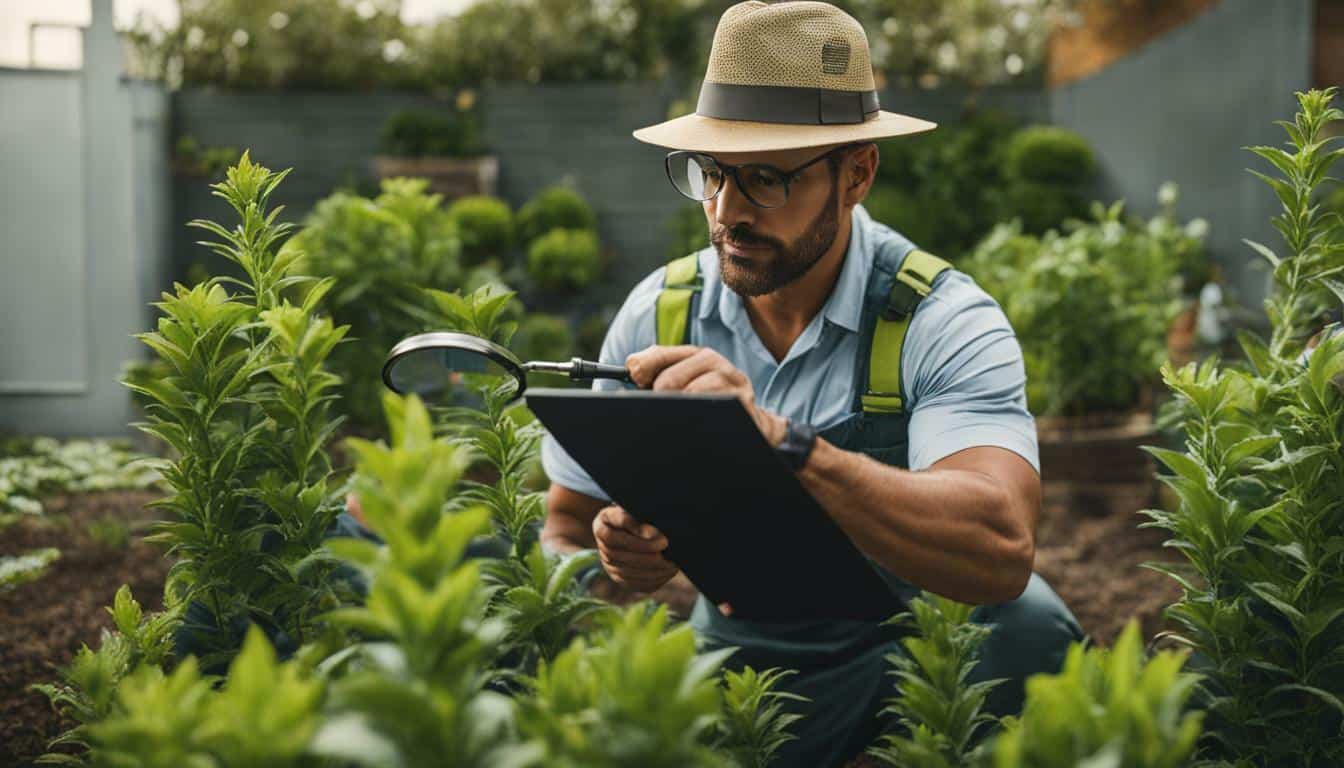

Leave a Reply